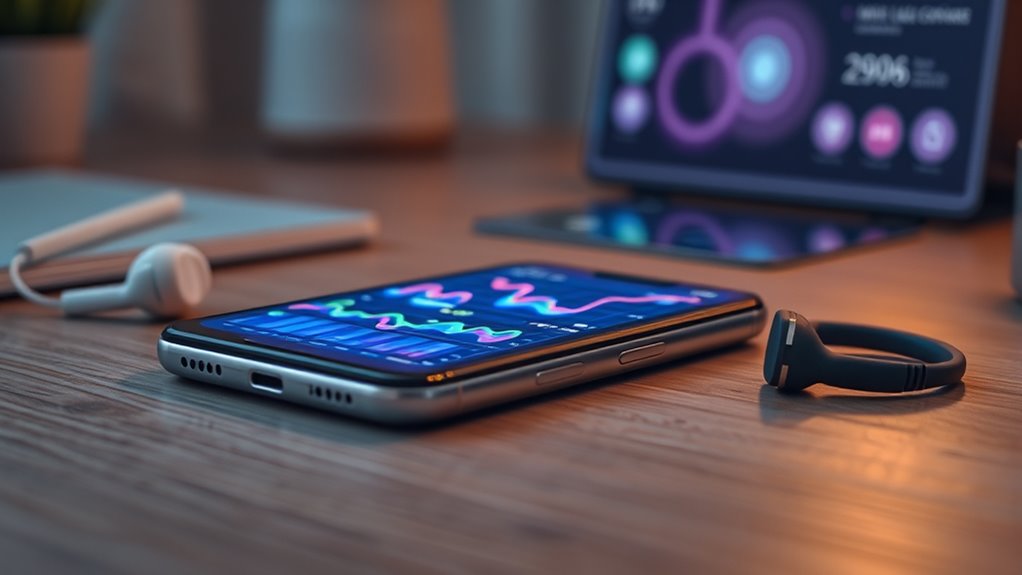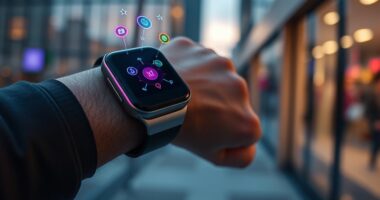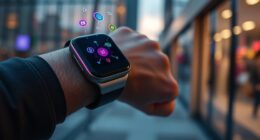Digital phenotyping uses smartphones to constantly observe your behavior, such as activity levels, sleep patterns, app use, and communication habits. This data helps identify early signs of mental health issues like depression or anxiety, allowing for personalized support without being intrusive. Privacy and security are prioritized through encryption and transparent consent. By understanding how your phone can reflect your mental state, you gain insights into innovative ways to support your well-being—if you keep exploring, you’ll learn more about this fascinating approach.
Key Takeaways
- Smartphones continuously collect behavioral data like activity, sleep, and communication patterns to monitor mental health.
- Digital phenotyping provides real-time, objective insights to support early detection and personalized mental health care.
- Data privacy is protected through anonymization, encryption, and transparent consent processes to ensure user trust.
- It complements traditional mental health approaches without replacing clinicians, enhancing diagnosis and treatment strategies.
- Ethical use and security measures prevent misuse of sensitive information while respecting individual rights.

Have you ever wondered how your smartphone can reveal insights about your mental health? It’s a fascinating idea, but one that’s becoming increasingly real with the rise of digital phenotyping. Essentially, your phone acts as a constant observer, collecting behavioral markers that paint a detailed picture of your mental state. These markers include patterns like your activity levels, sleep habits, typing speed, app usage, location data, and even your communication frequency. By analyzing these indicators, researchers and clinicians can detect early signs of mental health issues such as depression, anxiety, or mood swings. The goal is to intervene sooner and provide tailored support, all without intrusive methods.
However, you might be wondering about the implications of this kind of data collection. Data privacy is a major concern in digital phenotyping. It’s indispensable that your information is protected and used ethically. When your smartphone gathers behavioral markers, it’s not just collecting random data; it’s capturing sensitive details about your daily routines and emotional health. Ensuring data privacy involves strict protocols, anonymization, and transparent consent processes. You should always know what data is being collected, how it’s stored, and who has access to it. This transparency helps build trust and reassures you that your personal information isn’t being misused.
Despite the potential benefits, balancing data privacy with the need for meaningful insights remains a challenge. Researchers and developers are working hard to implement security measures that safeguard your information while still allowing for accurate analysis. For example, some systems process data locally on your device rather than sending everything to the cloud, reducing risks of breaches. Others employ encryption and strict access controls to prevent unauthorized use. Ultimately, your participation in digital phenotyping depends on this delicate balance—feeling confident that your behavioral markers are being used responsibly, without compromising your privacy.
In addition to privacy concerns, it’s important to understand that digital phenotyping isn’t meant to replace traditional mental health care. Instead, it complements existing approaches, providing real-time, objective data that can enhance diagnosis and treatment planning. You might not even realize it, but your smartphone can serve as a silent partner in managing your mental well-being. As technology advances, expect these tools to become more sophisticated, offering personalized insights while respecting your rights and privacy. The key is maintaining a transparent, ethical framework so you can benefit from this innovative approach without sacrificing your trust or security. Incorporating whole foods and balanced nutrition can also support mental health, illustrating how lifestyle choices complement technological tools in overall well-being.
Frequently Asked Questions
How Accurate Is Digital Phenotyping Compared to Traditional Mental Health Assessments?
You wonder how accurate digital phenotyping is compared to traditional mental health assessments. Validation studies show that digital phenotyping can offer reliable measurement, but it’s still evolving. Its measurement reliability varies depending on the data type and context. While it provides real-time insights and continuous monitoring, it’s not yet a complete substitute for traditional assessments. You should consider it as a complementary tool, with ongoing research improving its accuracy over time.
What Are the Main Privacy Concerns With Smartphone Data Collection?
Think of your data like a diary; privacy concerns are real. You worry about who accesses your information, so data encryption is essential to keep it secure. User consent is equally important, ensuring you’re in control of what’s shared. Without clear permissions, your personal details could be exposed or misused. Protecting your privacy means safeguarding your trust, so always stay informed and assertive about your rights in data collection.
Can Digital Phenotyping Predict Mental Health Crises Before They Occur?
You might wonder if digital phenotyping can predict mental health crises before they happen. It uses behavioral biomarkers such as sleep patterns, activity levels, and communication habits to identify early signs. By analyzing this data, you can enable early intervention, potentially preventing serious issues. While promising, it’s crucial to take into account privacy and accuracy, but in theory, it offers a proactive way to support mental health.
How Accessible Is Digital Phenotyping Technology for Underserved Populations?
You might think technology adoption is seamless, but socioeconomic barriers still block many underserved populations from accessing digital tools. Ironically, while digital phenotyping promises mental health insights, those who need it most often can’t afford or access the devices and connectivity required. As a result, disparities grow, leaving vulnerable groups behind in a digital divide that’s as wide as ever, despite the potential for broader mental health support.
What Are the Ethical Implications of Continuous Mental Health Monitoring?
You should consider that continuous mental health monitoring raises ethical issues like informed consent and data ownership. You need to guarantee users fully understand how their data is collected, used, and shared. Protecting privacy is vital, so you must establish clear policies and give individuals control over their information. Addressing these concerns helps maintain trust and respects personal autonomy in mental health technology.
Conclusion
So, here you are, with your phone tracking your every move and mood, thinking it’s helping your mental health. Ironically, while these devices promise insight and support, they often just reveal how much time we spend avoiding real human connection. Maybe instead of relying on screens to understand ourselves, we should just put the phone down and actually face what’s going on inside. Sometimes, the best insights come when you look away from the screen.










